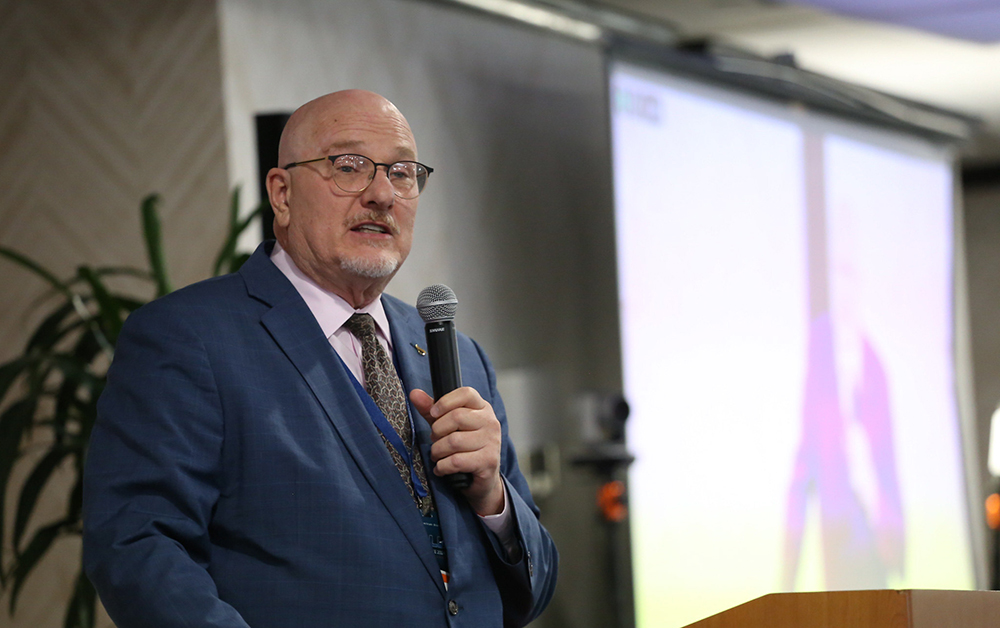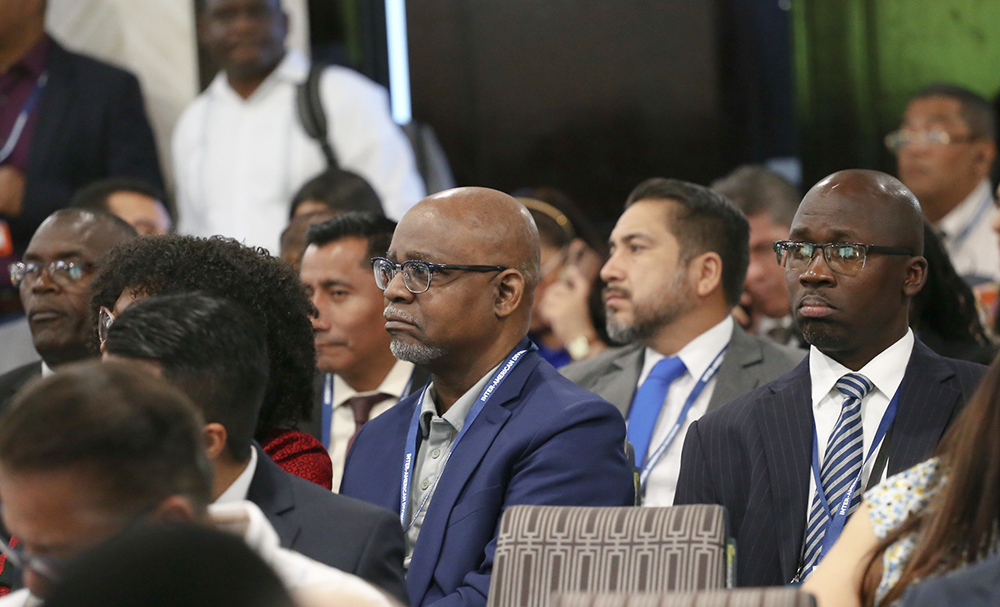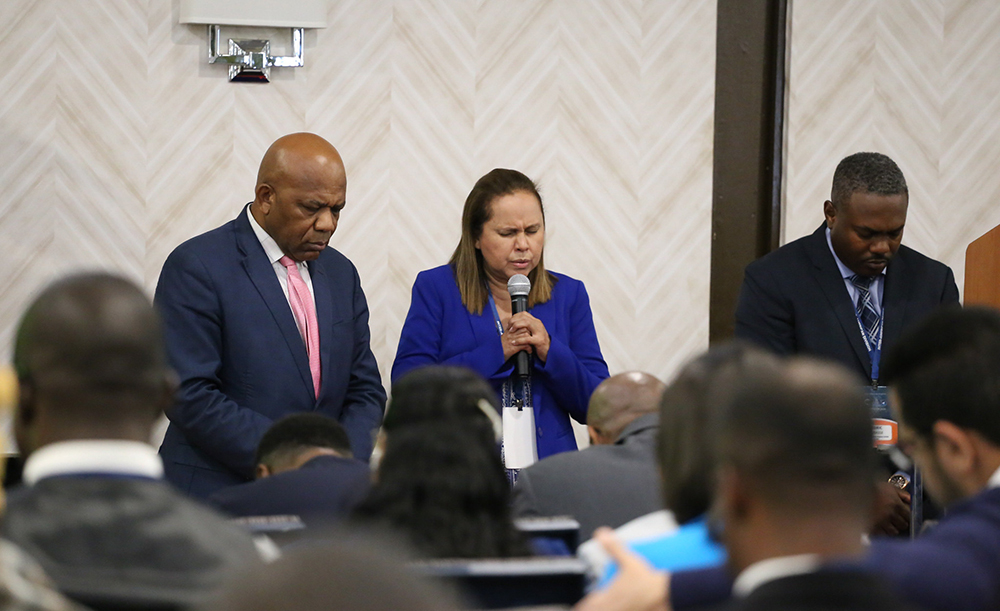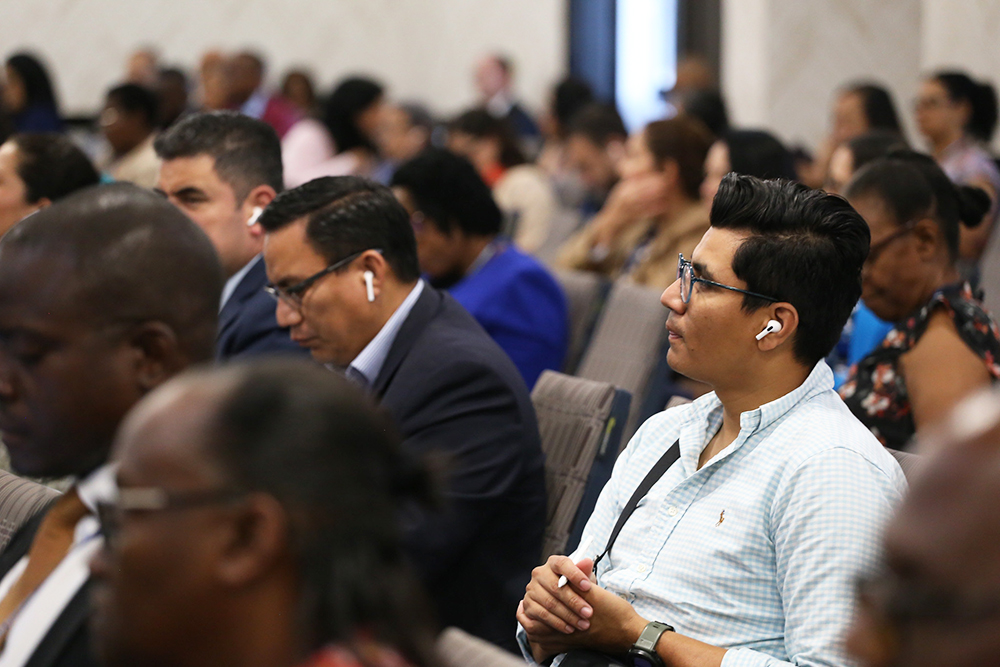‘As Church Leaders, Your Role Is to Protect the Sheep’
Adventist Risk Management president shares tips, issues warnings at SeLD Conference session.
July 26, 2024 | Miami, Florida, United States | Marcos Paseggi for Inter-American Division News
Loss is part of a our world, said James Winegardner, president of Adventist Risk Management (ARM) for the Seventh-day Adventist Church. “It’s inherent.” In that context, loss causes risks, he said. Winegardner’s presentation took place during the third and last day of the Inter-American Division Segment of Leadership Development Conference (SeLD) in Miami, Florida, United States, July 24, 2024.
In his plenary session, Winegardner sought to explain what risks are involved and how to manage and minimize them in the context of the Adventist Church activities, programs, and regular functioning.

Adventist Risk Management President James Winegardner addresses church leaders at this year’s SeLD Conference on July 24, 2024, in Miami, Florida, United States. [Photo: Libna Stevens/IAD]
Winegardner explained that church workers are responsible for their personal risks, but above all, they are responsible for the corporative risks of the organization they belong to. In this context, accountability is key, he emphasized. “Sometimes, in the church we don’t have sufficient accountability,” he said. So, when talking about risks, the question is if we are worrying about the right things. What should we be worrying about? Asked Winegardner.
He explained that when we have risks in our lives, we have several choices. We can avoid risks. “In our organization, we can avoid risks by not owning property. But do you think you can run your organization without owning property?” he asked. “We try to avoid risks, but some risks we have to take.”
Another option is to mitigate risk, “to do things right.” In that sense, Adventist Risk Management has many resources available to help church organizations mitigate risk, minimize the risk you face in your organization, he shared. “Being as safe as you can be is easier than you think, because it’s all about awareness,” Winegardner said. “And you as leaders can infect your members and other leaders with awareness.”
Creating Awareness, Transferring Risk
There are several ways of creating awareness, said Winegardner. One of them is making use of the resources ARM offers. ARM officers can also attend church workers’ meetings to explain and teach how to mitigate risks, he said, to share “ideas about safety and protection.”

Hundreds of administrators, department directors, pastors and church elders listen in during James Winegardner’s risk management presentation during Inter-American Division’s SeLD Conference, July 24, 2024. [Photo: John Garcia/IAD]
In the context of the Adventist Church operation, there are specific risks. “Stuff is a risk,” said Winegardner. “We call it property insurance. You have churches, you have cars, you have buses, you have schools… You have a lot of stuff you’re responsible for.”
To mitigate such risks, we need to have the awareness of who owns it, he said. “You may think you own it, but God owns it. Our facilities, including your offices, are God’s house.” He added, “I have a saying, which is, ‘If it’s worth keeping, it’s worth taking care of. If it’s not worth taking care of, it’s not worth keeping.’”
“What loss can you tolerate?” It is a question that you should ask, Winegardner told Adventist leaders, because if you can’t tolerate losing something, you should take care of it and insure it. The same applies to church buildings and other church facilities. “If you can’t afford to build it out of your budget, it has to be insured,” he said.
Cyber Liability
Cyber liability is something that some leaders may think it’s not so important, Winegardner acknowledged. To prove the contrary, he suggested a hypothetical situation. “What if you declared the upcoming month of August a computer-free month?” he asked. “Would you get anything done? Would your workers get anything done? No email, no accounting… You can’t do that!” He added, “If you can’t afford to do that, you cannot afford not to have cyber liability insurance.”

One of several prayer sessions held during day three of SeLD Conference.[Photo: Libna Stevens/IAD]
A second benefit about cyber liability insurance is not the money they pay if you lose; it’s the remediation they provide while you recover, said Winegardner. “It’s really important to have that remediation, because it takes professionals who are not already on your team to rebuild your service after a denial-of-service attack.”
Cyber liability is extremely expensive. So, another think you must do is to train your people, “because your biggest vulnerability is your people,” he told church leaders. “So, if you need some cyber advice, please call us. We can help you to get your cyber program up to speed. We can give you to the right people to get it done. Don’t think you are immune.”
Protecting from Other Risks
“Our role as a church is not to injure people,” emphasized Winegardner. “So, how do we protect our people?” He suggested some “easy things” that can help a church or church organization protect others, including putting windows on doors, making sure Pathfinder leaders are not alone with children, doing background checks, and such. “We have a lot of training on this, which could help you,” he told leaders.
Winegardner also referred to reputational risk. “You have a risk that we can’t insure,” he told Adventist leaders. “There’s only thing that can protect your reputational risk, and that’s your integrity,” he said. “If your reputational risk fails, you are not hurting yourself as much as you’re hurting the church.”

SeLD Conference delegates attend one of dozens of seminars held on the last day of the annual event. [Photo: Libna Stevens/IAD]
Protecting the Sheep
Winegardner also called church leaders to make sure proper contracts are signed every time a ministry holds and activity in the church premises, and make sure they are covered against all risks, including sexual molestation. He warned, “The rehiring of someone who has done improper activity is a reputational loss for you, it is a potential loss of millions, too.” But above all, Winegardner emphasized, “you have a moral obligation to protect the children of your church.” With your position, he said, “comes a deep burden of responsibility that cannot be delegated to anyone else… Your influence is much greater than you think it is.”
Finally, Winegardner quoted Matthew 25 from the Bible, calling Adventist leaders to remember that when Jesus comes, what will make all the different is “the way you treated innocent, vulnerable people with grace, and kindness, and love, and attention, and care… Always remember that as leaders, your role is to protect the sheep.”